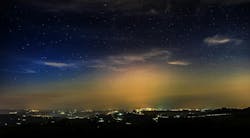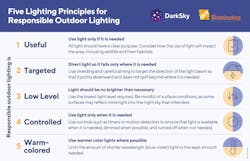What are you doing for International Dark Sky Week?
Next week is International Dark Sky Week 2024, and one of the groups behind it, DarkSky, has a few ideas on how the public can honor the occasion, which aims to minimize light pollution and its harmful effects on humans, plants, and animals.
“International Dark Sky Week is a worldwide celebration of the dark and natural night,” DarkSky explains on its website. “For many, the dark night is often misunderstood, unfamiliar, and frightening. But the natural night is filled with wonder and awe, and is critical to the health and wellbeing of our planet. We invite you to join us as we discover the night together and take action to reduce light pollution!”
Tucson, Ariz.–based DarkSky — previously known as the International Dark-Sky Association — has set up a web page on which individuals can commit to the cause. On this particular page, DarkSky is not soliciting donations (although people are welcome to contribute money elsewhere on the site, and to become members). Rather it is simply looking for people to dedicate themselves to the group’s mission, including the “Five Principles” of outdoor lighting that DarkSky devised in 2020 along with the NYC-based Illuminating Engineering Society (IES).
The ready-to-click form reads: “I pledge to protect the night by following the Five Principles for Responsible Outdoor Lighting, using lights only when and where I need them, and learning more about the impacts of artificial light on wildlife, habitats, and my community.”
The goal of the Five Principles is to minimize levels and harshness (see poster).
To help with education, DarkSky is running a series of daily online lectures through the week that look at the effect of night light on sleep and circadian health, night light and insects, Navajo perspectives, and other subjects.
DarkSky in general works to minimize light pollution from a myriad of sources including streetlights, industrial lighting, electronic advertising, parking lots, greenhouses, apartment buildings, landscape illumination, and more.
The group aims to preserve views of the stars, a scene that it says is rapidly diminishing. It has also identified harmful effects that artificial light can have on wildlife and ecosystems, human health, and on energy and climate.
DarkSky runs a program to certify lights as suitable for night use.
High school student Jennifer Barlow started International Dark Sky Week in 2003. It is held annually during April’s new moon, when night skies are the darkest. This year it runs from April 2–8, coinciding with North America’s total solar eclipse on April 8.
In one recent example of light pollution working its way into the political agenda, a U.K. House of Lords committee has called for government action. One challenge in the general fight against light pollution is the absence of consistent measurement methods for sizing up both pollution levels and the effects.
MARK HALPER is a contributing editor for LEDs Magazine, and an energy, technology, and business journalist ([email protected]).
Follow our LinkedIn page for our latest news updates, contributed articles, and commentary, and our Facebook page for events announcements and more. You can also find us on the X platform.

Mark Halper | Contributing Editor, LEDs Magazine, and Business/Energy/Technology Journalist
Mark Halper is a freelance business, technology, and science journalist who covers everything from media moguls to subatomic particles. Halper has written from locations around the world for TIME Magazine, Fortune, Forbes, the New York Times, the Financial Times, the Guardian, CBS, Wired, and many others. A US citizen living in Britain, he cut his journalism teeth cutting and pasting copy for an English-language daily newspaper in Mexico City. Halper has a BA in history from Cornell University.





![The DesignLights Consortium continues to make progress in shifting outdoor lighting products and implementation practices toward a more restrained and thoughtful strategy. [Image does not represent a DLC qualified fixture.] The DesignLights Consortium continues to make progress in shifting outdoor lighting products and implementation practices toward a more restrained and thoughtful strategy. [Image does not represent a DLC qualified fixture.]](https://img.ledsmagazine.com/files/base/ebm/leds/image/2024/08/66be810888ae93f656446f61-dreamstime_m_265700653.png?auto=format,compress&fit=&q=45&h=139&height=139&w=250&width=250)
